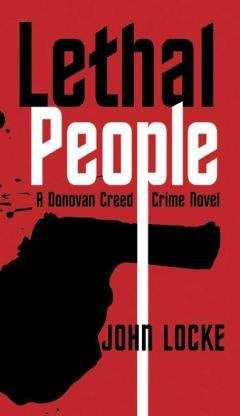John Locke - Lethal Experiment
For now it was working. Nadine helped me understand it was a question of degree. Everyone is guilty of something, but not everyone can agree on the severity of a crime. And everyone has a different yardstick for what warrants the death penalty.
For me, according to Nadine, the killing has to either benefit the victim or society. For example, I had no problem putting Robbie out of his misery after Callie dealt him a mortal wound. That benefited the victim. When I kill terrorists for Homeland, I’m benefitting society.
In preparation for killing Quinn, I’d asked Nadine if I would have been able to kill Tara Siegel. She said, “You could have killed Tara without batting an eye as long as it benefitted her or society. If Tara had turned against Homeland Security, or if she had violated your moral code by threatening to kill Kathleen or Addie, it wouldn’t have the slightest psychosomatic effect. That’s why Callie had no problem pulling the trigger. Callie perceived Tara as a serious threat to her life with Eva. But you weren’t convinced of that at the time. When Callie shot her, you were still trying to work out an agreement with Tara. When Callie took matters into her own hands, your brain perceived a senseless killing.”
I’d asked Nadine if that wasn’t just so much psycho babble.
She said, “Your body reacts to things that appear to be real, whether real or not. For example, if I were to punch Nurse Carol in the stomach, totally unprovoked, she’d double over in pain. If tomorrow I started to punch her in the stomach, but stopped my fist just short of the target, she’d probably still double over to protect herself from the perceived blow.”
“So it’s not the actual violence, but my perception of it that counts.”
“As long as you’re in charge of the killing, and you know the killing has nothing to do with someone’s idea of entertainment, you’ll be fine.”
I’d said, “Nadine, what happens to you when I leave here?”
“I’ll go home and learn how to have some fun in my life. I plan to dote on my nephews and make friends in my neighborhood.”
“You’ve earned enough to retire?”
“Yes, with the money I’ve saved and the fortune Darwin has paid me to nursemaid you, I’m set for life.”
“So you and I are done?”
“For you I’ll come out of retirement any time.”
“You’ll talk to me as a friend? Help me through the hard times?”
“Don’t be ridiculous. Once you leave, if you want to talk to me, you’ll have to reach into your pocket.”
“Your words sound harsh,” I said, “but I see a smile on your face.”
“Well, don’t tell anyone,” Nadine said.
That was a week ago. Now, with Callie beside me, mourning Quinn’s death in her own, quiet way, I thought of the effect Quinn had on the other people in my life. Kathleen and Addie had taken to Augustus, had accepted him with open arms. He’d protected Addie day and night at the burn center when Joe DeMeo’s goons wanted to kill her. He’d said nice things about me to Kathleen the first time I thought I’d lost her. By her own account, it was the comments Quinn made that helped her see me in a different light.
I continued putting miles between us and the body of our good friend.
“So what happens now?” Callie said.
“Now we rescue Alison.”
Chapter 53
Quinn’s torture chamber was the basement of an abandoned building in an isolated part of the city. He actually owned the building, so there was no danger of losing the sweat equity he’d put into renovating it. I’d been inside before, and remembered he’d put drains in the floor, reinforced the walls, and soundproofed them with the same material used in upscale movie theaters.
As I pulled into the parking area, a random thought crossed my mind, something I remembered from a previous visit: in addition to being an excellent saxophone player, Quinn had been an accomplished chef. He used to blister the skin of his torture victims with the same small handheld butane torch he used to caramelize the surface sugar on his crème brulees.
There were no parking lot lights, so I left the car headlights on to get a good look at the exterior of the building. I removed a bag of tools from the trunk and slung them over my shoulder. Callie got out and we stood next to the car and looked at the gray, rundown building. To be precise, the overall color was gray, but there were faded and peeled areas that revealed former colors. I’d say the bricks had been painted at least three times over the decades. Two feet from the top of the building, a series of rusted pipes ran horizontally across the back and disappeared around the side.
“I don’t see any wires,” Callie said. “You think he’s got an alarm?”
“No way.” Last thing in the world he’d want would be to lead people to his workplace.”
“His workplace,” she said.
Standing there quietly for a moment felt right, somehow. Callie finally spoke. “I felt a bit sick tonight, setting the charge.”
“Augustus always lived on the edge,” I said, “but this time he crossed the line.”
Callie studied the building some more. “It would have been tough saving Alison if he were alive.”
“He’d be a tough adversary.”
Callie said, “You really think she’ll be sane enough to work for Sensory after this?”
I said, “Are any of us sane? Hell, this experience might make her a better agent.”
Callie nodded. “You ready?”
I put my hand in my pocket and felt the silver dollar, felt the satisfying heft of it, like I’d done ten thousand times before.
“Let’s get her out of here,” I said. “Assuming she’s alive.”
“Let’s get her out either way,” Callie said.
Chapter 54
If you broke in through the front door like we did, you’d find yourself standing in a small entry office, with reinforced glass walls that offered a view of the huge room beyond. We clicked on our pen lights, opened the door and walked into the dank old warehouse, where I was immediately struck by the immaculately clean concrete floor. I wondered how many times a month Quinn had to scrub it to keep it completely free from dust and dirt and blood.
We moved slowly and steadily through the open space until we came to the little concrete room where I believed Alison was being held captive. I called out her name, but heard no response.
“Help me find an electrical outlet,” I said.
“The power’s not on,” she said, and I doubt you want to flip the main circuit breaker and light the whole place up.”
“He keeps the lights off , but the outlets work.”
We found one close enough to reach with an extension cord. Callie held the flashlight beam on my bag while I opened it and selected the proper tools for the job.
“You’re never going to get through that door,” she said.
She was right. The door and frame were made of thirty-gauge, cold rolled steel. Quinn had told me that every twelve inches of it was reinforced with a checker board of steel columns, and that the gaps between the columns were filled with hardened concrete. The door was secured by three kick-proof, pick-proof locks, and a hardened steel security bar.
“I’m going through the concrete wall,” I said.
Callie swept this part of the warehouse with her flashlight.
“What’s that room over there?” she said.
“That’s the torture room. If you want, you can drag a chair out of there and bring it over to sit on. You may as well, this is going to take awhile.”
“Will the car be safe where it is?”
“Probably. People around here have seen Quinn. I doubt they’d want to make him an enemy.”
While Callie left to get a chair, I positioned a drill against the center of the wall about three feet above the floor, and started the process.
When Callie returned she sat in her chair and said, “Did Augustus really think you wanted to tag team the hookers?”
“I believe he did.”
“You boys ever do that before?”
“Nope.”
“Never got drunk, decided what the hell?”
“Never did,” I said.
“You remember your first time?”
“With a hooker?”
“Uh huh.”
“You never forget your first,” I said.
“I suppose.”
I reversed the drill bit out of the hole to inspect my progress.
Callie said, “Tell me about it.”
I turned to look at her. “What, the first time I slept with a hooker?”
She nodded.
“On purpose?”
She laughed, and I resumed working on the wall while I thought about it.
“I can’t guarantee she was a hooker,” I said. “But she was certainly a stripper.”
It was summer and I was just out of high school. In a few months I’d be a sniper for the army, but that night I was in Bossier City, Louisiana, where I’d planned to go gutter-sniping with a buddy at a club on the Bossier strip. He never showed, so I picked up a skinny, thatch-haired stripper an hour before closing time and took her to the little fleabag motel across the four-lane highway where we did a couple of lines off a stained, wood veneer table. She peeled down to her panties and we sat on the edge of the bed and started making out.
Someone kicked the door open, startling us. Her husband, one of the bouncers from the lounge, the one she hadn’t mentioned—aimed a .38 snub at my face, cocked the trigger and told me to start praying.
In real life you’re not going to have the stones to walk up to a total stranger and blow his brains out, even if you’re a badass, and yes, even if the stranger happens to be in a hotel room groping your semi-naked wife. I didn’t have any real-world experience at the time to help me know this, but it was something I understood on a gut level.
I said, “I don’t know any prayers, but you know what kind of woman you married. Killing me won’t change her behavior.”
The big man stood just inside the room with the door propped open behind his back. The door was splintered around the lock but it was still on its hinges and the frame was intact. We looked at each other in that way men do when they’re sizing each other up, just before a fight. In the background I could hear his wife selling me out enthusiastically. She used a lot of words to say she’d been high as a kite and I’d taken advantage of her. Not wanting to give him too much time to focus on that viewpoint, I headed for the door. I knew he’d try to sucker punch me as I walked by, so I ducked when I felt it coming. I did a good job of it, but he had the angle on me and the butt of his gun grazed the side of my head and spun me around. I lurched out the door and slid a bit on the gravel in the parking lot before gaining enough traction to start sprinting. I heard him coming after me but he didn’t have the legs. Twenty yards into it he gave up and shouted, “Get the fuck outta here! You ever come back, you’re a dead man! You hear me?”
Yeah, I heard him.
I was half a block away, crossing the highway, backtracking toward my car and I could still hear him. Only what I heard now was the sound of him beating her. I heard her screaming above the traffic noise, begging him to stop. I was closer to the bar than I was to them but I still heard his yelling and her screaming over the muted roar of the band inside. I doubled back to check on her, but the noise had stopped. I crept up to the room, peeked through the broken door.
“What did you see?”
“Two stoners having makeup sex.”
“Women,” Callie said. “Can’t live with ‘em—”
“What about you?” I said, “Your first time with a john.”
“I might be splitting hairs here, but I wasn’t an authentic hooker.”
The drill bit finally burst through the wall. I reversed the direction and retracted the drill, leaving a quarter-inch hole. I cupped my hands around the opening and shouted, “Alison!” Then I put my ear up to it and heard a muted response that sounded like someone saying the letter “M” over and over.
“Yeah,” I said to Callie.
“Yeah, what?”
“You might be splitting hairs when you say you weren’t an authentic hooker.”
“Kiss my ass,” she said.
“I’d be delighted to. And while we’re on the subject…”
“Of my ass?”
“Of johns. You ever have any issues with violence?”
“One time a sweet old gentleman enjoyed my company for about four minutes before smacking me in the back of the head with brass knuckles, knocking me out, and robbing me.”
“See, that’s the problem with civilians. They’re emotional, unpredictable, and they come at you from all the wrong angles. By the way, Alison’s alive. She’s got her mouth taped up.”
“Well that’s good news. How long till we’re in?”
“Let’s put it this way. Have you had dinner yet?”
“I don’t eat much.”
“Good thing.”
I started drilling the second hole.
Chapter 55
When the drill started smoking, I stopped a few minutes to let it cool. Callie took the opportunity to say, “The first time you put your life in danger.”
“What about it?”
“How old were you?”
I thought a minute.
“Ten.”
“Early bloomer,” she said.
I’d just finished fourth grade. Summer break, my grandfather took me on a camping trip in the Colorado foothills. We spent the second night in a little cabin in a roadside campground, and the next morning I got up early and went for a hike. I’d probably gone two miles when I realized all the pines started looking alike. I stopped and made a slow, complete turn, searching for a trail. But there was none. I wasn’t exactly afraid, but I wasn’t exactly fearless either. I closed my eyes and took a step in the direction I assumed would take me back to the campground. No, that step was slightly higher. I took a step in the opposite direction. Slightly lower. Funny how sometimes you can figure things out with your eyes closed that you’d never know by looking.
The drill had cooled off enough to continue my assault on the wall. I went at it with gusto. While I worked, I thought about that morning, thirty years ago, when I was lost in the Colorado foothills.
It took twice as long to get back that morning, and my route wasn’t a direct one, so I wound up approaching the campsite from the opposite way I’d started. There was a fenced-in corral I hadn’t seen the night before, and a couple of flea-bitten horses picking at the sparse grass. A good sized kid, maybe thirteen, with strawberry hair and freckles—saw me coming out of the woods. He pointed to the fence and giggled the laugh all childhood bullies have in common. He was older and bigger than me and I wanted to avoid confrontation. I was also dying of thirst and wanted to let my grandfather know I was safe. Nevertheless, I allowed my eyes to follow the direction the big kid was pointing.
There was something moving on top of a fence post. I walked over for a closer look and saw that the little bastard had stuck a box turtle on top of the fence post. He’d centered it in such a way that the bottom of the turtle’s shell was perched on the post but its head, feet and tail dangled in the air on all sides. The turtle’s feet moved furiously in a futile effort to make contact with something solid. It was apparent the kid intended the turtle to die this way, either from thirst, exhaustion, or maybe he expected it to boil to death as the day wore on. The kid didn’t care, he thought it was hilarious. He kept grinning and pointed to the line of fence posts behind me, where I saw a dozen more turtles lined up as motionless as any group of sports trophies.




